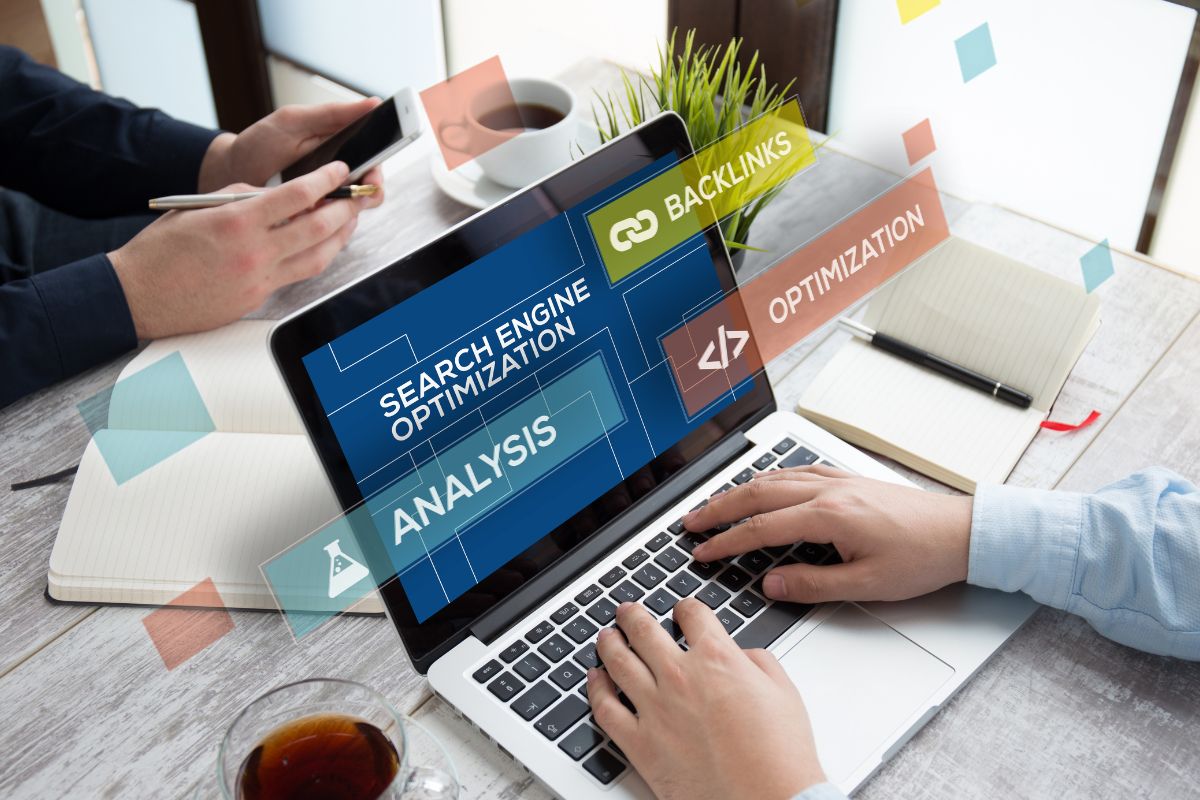If you have a website or an online business, you’ve probably heard the term SEO thrown around a lot. But what is SEO, and why should you care about it?
In today’s digital world, having a strong online presence is crucial. You want people to find your website easily when they search for something related to your business. That’s where programmatic SEO comes in, automating and optimizing your SEO efforts to ensure your website ranks high in search results.
Let’s dive into what SEO is and why it’s so important for your online presence.
What Is SEO? Basics and Best Practices
The Fundamentals of SEO

SEO stands for Search Engine Optimization. In simple terms, it’s the process of making your website better so that search engines like Google can find it and show it to people.
The main purpose of SEO is to improve your website’s visibility in search engine results pages (SERPs). When someone searches for something related to your business, you want your website to show up at the top of the list. The higher your site ranks, the more likely people are to click on it. More clicks mean more visitors and more visitors can lead to more customers.
Think of SEO as a way to help search engines understand your website and decide it’s the best match for what people are looking for.
Why SEO Matters
You might wonder, why SEO matters so much. Well, the answer lies in organic search traffic. This is the traffic you get when people find your website through a search engine, without clicking on ads. It’s like free advertising!
Organic search traffic is incredibly valuable. Studies show that most people don’t look past the first page of search results. If your website isn’t there, you’re missing out on a lot of potential visitors. In fact, the top result on Google gets about 27.6% of all clicks. That’s a huge chunk of traffic!
Benefits of SEO
Investing in SEO offers numerous benefits that can significantly impact your online presence and business growth. Here are some of the top advantages:
Increased Visibility and Brand Awareness
One of the most immediate benefits of SEO is increased visibility. When your website ranks higher on search engine results pages (SERPs), more people see your brand.
This increased exposure helps build brand awareness. Over time, people start recognizing and trusting your brand simply because they see it frequently in their search results.
Cost-Effectiveness Compared to Paid Advertising
SEO is incredibly cost-effective. Unlike paid advertising, where you pay for each click or impression, organic search traffic is free.
While it takes time and effort to optimize your site, the long-term benefits outweigh the initial investment. Once your site ranks high, you continue to receive traffic without ongoing costs. This makes SEO a smarter investment for long-term growth.
Long-Term Benefits of Sustainable Organic Traffic
One of the greatest strengths of SEO is its sustainability. Unlike paid ads, which stop bringing traffic once you stop paying for them, the benefits of SEO are long-lasting.
Once you achieve a high ranking, it’s easier to maintain that position with regular updates and good content. This means consistent, sustainable traffic over time.
In addition to sustainability,organic traffic tends to have better engagement rates. People who find your site through organic search are often looking for exactly what you offer. This means they are more likely to spend time on your site, engage with your content, and convert into customers.
Key Elements of SEO
To get the most out of SEO, you need to focus on both on-page and off-page elements. Let’s break down what these are and why they matter.

On-Page SEO
On-page SEO is all about optimizing the parts of your website that you control. Here are the key elements:
- Title Tags: These are the titles of your web pages. They show up in search results and are crucial for telling search engines what your page is about. Make sure your title tags are clear, concise, and include your main keywords.
- Meta Descriptions: This is the short summary that appears under your title tag in search results. A good meta description can encourage people to click on your link. It should be compelling and include relevant keywords.
- Headers: Headers (like H1, H2, H3) help structure your content and make it easier to read. They also tell search engines what your content is about. Use your keywords in headers to improve your SEO.
- Content Optimization: Your content should be high-quality, relevant, and useful to your audience. Use keywords naturally throughout your content, but avoid keyword stuffing. Make sure your content is easy to read and provides value.
- Keywords and Keyword Research: Keywords are the words and phrases people use to search for things online. Doing keyword research helps you understand what your audience is searching for. Use tools like Google Keyword Planner to find the best keywords for your content. Then, incorporate these keywords strategically throughout your site.
Off-Page SEO
Off-page SEO refers to actions taken outside your website to improve its ranking. The main elements include:
- Backlinks: These are links from other websites to your site. They are crucial because they act as votes of confidence from other sites. The more high-quality backlinks you have, the more authoritative your site appears to search engines. Focus on getting backlinks from reputable and relevant sites.
- Social Signals: Social signals are likes, shares, and comments on your social media posts. While social signals don’t directly impact your SEO, they can increase your content’s visibility and drive traffic to your site. Engage with your audience on social media to boost your content’s reach.
By optimizing both on-page and off-page elements, you can improve your website’s visibility, attract more visitors, and ultimately, grow your business. SEO might seem complex, but focusing on these key elements can make a big difference.
SEO Best Practices
To get the most out of your SEO efforts, it’s essential to follow best practices. These practices ensure that your website is optimized effectively and sustainably. Here are some key SEO best practices to keep in mind:
White Hat vs. Black Hat SEO Techniques
When it comes to SEO, there are two main approaches: white hat and black hat techniques.
- White Hat SEO: These are ethical practices that follow search engine guidelines. They focus on providing value to users and creating a good user experience. Examples include high-quality content, keyword optimization, and building genuine backlinks.
- Black Hat SEO: These are unethical practices that try to game the system. They often involve deceptive tactics like keyword stuffing, cloaking, and using link farms. While black hat techniques might offer short-term gains, they can lead to penalties from search engines, damaging your site’s ranking in the long run.
Always stick to white hat SEO to ensure sustainable, long-term success.
Importance of Quality Content and Regular Updates
In the realm of SEO, content reigns supreme. High-quality, relevant material not only draws in visitors but also keeps them engaged. Here’s what you should focus on:
- Quality Content: Make sure your content is informative, well-written, and provides value to your audience. Use your keywords naturally and avoid overstuffing.
- Regular Updates: Search engines favor websites that are regularly updated with fresh content. This shows that your site is active and relevant. Consider maintaining a blog or regularly adding new articles, product updates, or news.
Mobile Optimization and Site Speed Considerations
With more people using mobile devices to browse the web, mobile optimization is crucial for SEO. Additionally, site speed plays a significant role in user experience and search rankings.
- Mobile Optimization: Ensure your website is mobile-friendly. This means it should look good and function well on all devices, including smartphones and tablets. Use responsive design to adapt your site to different screen sizes.
- Site Speed: A website that loads quickly enhances user experience and lowers bounce rates. Utilize tools such as Google PageSpeed Insights to assess your site’s speed and receive suggestions for enhancement. Improve speed by optimizing images, employing efficient coding techniques, and utilizing browser caching.
Common SEO Mistakes to Avoid

Even with the best intentions, it’s easy to make mistakes in your SEO strategy that can harm your website’s ranking and visibility. Here are some common SEO mistakes you should avoid:
Keyword Stuffing and Other Outdated Practices
In the early days of SEO, cramming as many keywords as possible into your content was a common tactic. However, search engines have become much smarter and now penalize this practice.
- Keyword Stuffing: Overloading your content with keywords makes it sound unnatural and can annoy your readers. It can also lead to search engines penalizing your site, causing it to drop in rankings. Instead, focus on using keywords naturally and contextually.
- Other Outdated Practices: These include using invisible text, doorway pages, and low-quality article spinning. Such tactics might offer short-term gains but can ultimately get your site banned from search engines.
Ignoring Technical SEO Issues
Technical SEO involves optimizing the infrastructure of your website so search engines can crawl and index it effectively. Ignoring technical issues can severely impact your site’s performance.
- Broken Links: These frustrate users and can negatively affect your site’s ranking. Regularly check for and fix broken links.
- Slow Load Times: As mentioned earlier, a slow website can lead to higher bounce rates and lower rankings. Make sure your site loads quickly on both desktop and mobile devices.
- Missing Alt Text: Alt text for images helps search engines understand the content of your images. Always add descriptive alt text to your images.
- Non-Responsive Design: With the rise of mobile browsing, having a responsive website is crucial. Ensure your site looks good and works well on all devices.
Not Focusing on User Experience
User experience (UX) plays a significant role in SEO. Search engines prioritize sites that offer a good user experience.
- Poor Navigation: A confusing or cluttered navigation can frustrate users and lead to high bounce rates. Make sure your site’s navigation is intuitive and easy to use.
- Low-Quality Content: Content that is irrelevant, poorly written, or filled with errors will drive users away. Focus on creating high-quality, engaging content that provides real value to your audience.
- Ignoring Mobile Users: As more people browse on their phones, a mobile-friendly site is essential. Ensure your site is optimized for mobile devices to keep mobile users engaged.
Avoiding common SEO mistakes like keyword stuffing, ignoring technical SEO issues, and not focusing on user experience can help you maintain a healthy, high-ranking website. By steering clear of these pitfalls, you can create a better experience for your visitors and improve your site’s performance on search engines.
Partner with SEO Experts to Boost Your Online Presence
Understanding and implementing SEO is crucial for the success of your online presence. However, navigating the complexities of SEO can be challenging. That’s where we come in.
Partner with our Atlanta local SEO agency and let our experienced SEO professionals craft a tailored digital marketing strategy just for you.
At Newman Web Solutions, we specialize in ethical, results-driven SEO practices that deliver measurable growth. Whether you want to increase sales, boost visibility, or drive engagement, we’re committed to helping you achieve outstanding results.
Don’t leave your success to chance. Contact us today at (404) 301-9189 or schedule a free 30-minute marketing strategy session to see how we can help your business thrive online.





